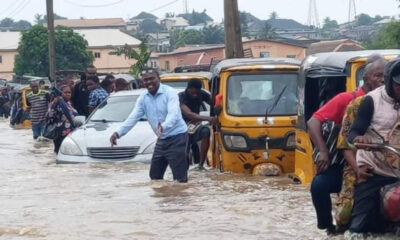Africa
I have no contact with people, no food, no medicine – Deposed Niger president

I have no contact with people, no food, no medicine – Deposed Niger president
Former Military Head of State, Gen Abdulsalami Abubakar (rtd), met ousted Niger President, Bazoum, on Saturday.
Abdulsalami led a high powered delegation of the Economic Community of West African States (ECOWAS) to the troubled West African nation.
They arrived the West African Country Saturday in a last-ditch diplomatic effort to reach a peaceful solution with Niger junta.
The delegation met with Prime Minister Ali Lamine Zeine who received them at the airport and led them to the presidential palace.
They met with General Abdourahamane Tchiani, head of the junta, and his team for about 90 minutes and later President Mohamed Bazoum.
Speaking with journalists after the meeting, Abdulsalami said, “We met him and heard his side of the story. He told us what was done to him and the challenges he is facing. We will communicate this to ECOWAS leaders. Doors for talks are now open for a lasting solution.”
The former Head of State did not go into details of the discussion with the ousted president.
But some weeks ago, CNN quoted Bazoum in a series of text messages to a friend as saying he had been “deprived of all human contact” , with no one supplying him food or medicine.
According to the overthrown president, he had been living without electricity, a normal occurrence for all Nigeriens after Nigeria cut off electric power in response to the coup.
Bazoum said all of the perishable food he was supplied with has since gone bad, and he was now eating dry pasta and rice.
I have no contact with people, no food, no medicine – Deposed Niger president
Africa
Civil societies, Togo president on war path over new constitution eliminating elections

Civil societies, Togo president on war path over new constitution eliminating elections
The hope of having new leader in Togo has been dashed following the abolition of presidential elections in the West Africa country.
The development follows the signing of a controversial and widely condemned new constitution by President Faure Gnassingbe
The new constitution does not allow for election to the highest office in the land, an arrangement that will see the Gnassingbes consolidate their hold on power and extend their six-decade-long rule.
A statement from Gnassingbe’s office on Monday stated that, under the new legislation, only the parliament will have the power to select the president, eliminating direct elections.
According to Africa News, the election commission on Saturday announced that Gnassingbe’s ruling party had won a majority of seats in the nation’s parliament.
The report revealed that there was a crackdown on civic and media freedoms ahead of the vote, as the government banned protests against the proposed new constitution and arrested opposition figures.
READ ALSO:
- Rivers crisis festers as new factional Speaker emerges
- Cybersecurity levy suspension tears lawmakers apart, speaker overrules
- EFCC to arraign Sirika, daughter over fresh N2.7 billion contract scam
Also, the electoral commission banned the Catholic Church from deploying election observers.
In mid-April, a French journalist who arrived to cover the elections was arrested, assaulted and expelled. Togo’s media regulator later suspended the accreditation process for foreign journalists.
Provisional results showed the ruling Union for the Republic (UNIR) party won 108 out of 113 seats in parliament, and 137 out of 179 positions in the senate.
The new constitution also increases presidential terms from five to six years and introduces a single-term limit.
However, the almost 20 years that Gnassingbe has already served in office would not count toward that tally.
Togo has been ruled by the same family for 57 years, initially by Eyadema Gnassingbe and then by his son, Faure Gnassingbe, who took office after elections that the opposition described as a “sham.”
The political opposition, religious leaders and civil society say the proposed new constitution makes it likely that Gnassingbe will stay on when his mandate expires in 2025.
They also fear that the creation of a figure similar to a prime minister, to be selected from the ruling party, could become another avenue for Gnassingbe to extend his grip on power even beyond that new term.
Civil societies, Togo president on war path over new constitution eliminating elections
Africa
Father mourns 14-year-old daughter poisoned at school, says ‘I’ve failed you my baby’

Father mourns 14-year-old daughter poisoned at school, says ‘I’ve failed you my baby’
A father has mourned his 14-year-old daughter, Nomfundo Palesa Tyler Khumalo, who was allegedly poisoned at her school in South Africa.
It was gathered that the incident happened on 8 April 2024 and she passed away on 25 April.
 Details surrounding the circumstances of her death remain unclear.
Details surrounding the circumstances of her death remain unclear.
A murder case has been opened, and investigations are underway.
The family of Nomfundo is currently struggling to deal with the loss and seeking answers as to why and by whom she was targeted.
READ ALSO:
- Zamfara APC defends Mattawale, says protesters are rented crowd
- SERAP sues Wike, 36 govs over N5.9tn, $4.6bn loans
- Chelsea thrash West Ham to stay on track for Europe
Nomfundo’s father, Gift, on Sunday, May 5, wrote a heartfelt message on X to pay tribute to her.
“Never in my wildest dreams did I think you would end up on this page I’ve failed you my baby , should’ve protected you better we even spoke about you being home schooled after you recover unfortunately.. I’m so sorry If Possible I’d easily give up my life for yours,” he wrote on Sunday, May 5.
In an earlier post, he wrote: “I wish the after life is kinder to souls as precious as yours , there is no boundry for my love to you my baby Not even Death itself Don’t forget to visit us in our dreams more exp your Mother It’s never goodbye when there an after life promised I’ll see you soon my child.”
Father mourns 14-year-old daughter poisoned at school, says ‘I’ve failed you my baby’
Africa
Floods kill over 200 in Kenya, cyclone approaches

Floods kill over 200 in Kenya, cyclone approaches
The death toll from flood-related accidents in Kenya has surpassed 200 since March, the interior ministry announced Friday as a storm approached the Tanzanian coast.
Torrential rains have lashed parts of East Africa, causing flooding and landslides that have wrecked crops, buried homes, and displaced hundreds of thousands of people.
According to a statement from Kenya’s interior ministry, 210 people have died “due to severe weather conditions,” with 22 deceased in the last 24 hours.
More than 165,000 people had been evacuated from their homes, with 90 others missing, increasing concerns that the toll may increase further.
Kenya and adjacent Tanzania, where at least 155 people have died in flooding, are bracing for Cyclone Hidaya, which will bring heavy rain, wind, and waves to their coastlines.
Tanzanian authorities warned Friday that Hidaya had “strengthened to the status of a full-fledged cyclone” around 3:00 a.m. local time (0000GMT), about 400 kilometres (248 miles) from the southeastern city of Mtwara.
READ ALSO:
- BREAKING: N70bn fraud: Matawalle can’t escape probe, says EFCC as protesters storm anti-graft office
- Repentant Boko Haram members burn NDLEA, Customs checkpoints in Borno
- Lagos GDP hits N41tn, earns N433bn from IGR
“Cyclone Hidaya has continued to strengthen further, with wind speeds increasing to about 130 kilometres per hour,” they said in a weather bulletin.
Kenya’s interior ministry predicted that the storm would “bring strong winds and large ocean waves, with heavy rainfall,” and hit the shore on Sunday.
Since September last year, Burundi’s heavier-than-usual rains have killed at least 29 people, injured 175 others, and displaced tens of thousands, according to the United Nations.
The rains have been exacerbated by the El Nino weather pattern, a naturally occurring climate phenomenon that is normally associated with increasing temperatures worldwide, resulting in drought in some regions of the world and torrential downpours in others.
More than 300 people were killed by rains and floods in Kenya, Somalia, and Ethiopia late last year as the area struggled to recover from its worst drought in four decades.
Cyclone season in the southwest Indian Ocean typically lasts from November to April and produces approximately a dozen cyclones every year.
Floods kill over 200 in Kenya, cyclone approaches
-

 International3 days ago
International3 days agoNetanyahu rubbishes Hamas ceasefire proposal
-

 Politics3 days ago
Politics3 days agoAbia deputy gov candidate, lawmaker dump PDP
-

 metro3 days ago
metro3 days agoThree siblings attack school teacher for flogging brother in Port Harcourt
-

 metro2 days ago
metro2 days ago33 states face flooding risk, NEMA warns
-

 metro23 hours ago
metro23 hours agoCleric allegedly sets wife’s house ablaze following prayer disagreement in Ekiti
-

 metro2 days ago
metro2 days agoEkiti university expels students over viral bullying video
-

 metro3 days ago
metro3 days agoSix NSCDC officers arrested over N6bn fraud
-

 metro3 days ago
metro3 days agoMany injured as Police teargas Delta protesters




















